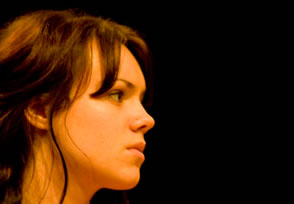|
A&E |
|
Antigone
This spring’s production of ‘Antigone’ amazes, enthralls with fantastic acting
The Advocate
For those expecting a stiff, monologue-ridden play for MHCC’s production of “Antigone,” they couldn’t be more wrong.
|
|||
On Wednesday’s opening night, with the incorporation of modern twists, the cast from the very beginning gives off a fire and a spark that ignites the rest of the performance.
While only the mention of the location Thebes gives away the play’s date, it is easy to picture “Antigone” anywhere in the world, in any time period, the story a fragment of anyone’s life.
The story is simple: a girl (Antigone) attempts to give her brother, Polyneices, a proper burial after he and her other brother, Eteocles, destroy one another fighting over the throne of Thebes. The new king, Creon, has declared that Eteocles will receive a proper burial, while Polyneices will be left to rot where his body lay.
Throughout its 90-minute duration, the play touches on elements of power struggles, family, civil disobedience, feminism, discontent and determination.
However, the themes aren’t what make this production of “Antigone.” It is the cast. Given that the cast is so small, each person becomes essential.
Heather Harlan doesn’t just play Antigone, she is Antigone, conveying her role with such conviction that one can not help but be inspired by Antigone and pity her at the same time. Harlan doesn’t just speak her lines; she draws you into Antigone so deeply that the character’s actions need no explanation.
She is followed by the impeccable Patrick Ford who transforms Creon, a character easily made into a villain, into a man torn between what he wants to do and what he must to for his throne.
In fact, it is the scene between Ford and Harlan that will grip the audiences the most, enthralling them as the scene flows from all out anger to quiet understanding and back again.
Desiree Stewart returns to the MHCC stage after her performance in “Guys and Dolls” earlier this year. Once again, she presents the same vibrancy and passion, refocusing it into a sister who decides all too late what was right.
Chorus, played by Melissa Rivera, expertly explains to the audience the context and themes, posing questions to make them think. Rivera has an energy that awakens the audience into thought and primes them for the act to come.
Only interacting with the characters toward the end, confronting them on their choices, Rivera provides a link for the audience to the performers on stage that works.
The entire cast works together to pull the audience to the edges of their seats, bringing the story to life. It is riveting to the very bitter, tragic end and once the lights come up the audiences will only be ready for more.
For those looking for a fascinating, interesting and fantastically acted play, they don’t have to look any further.

